The Religiousness in Disaster Management: Principles of Disaster Management in Islam
Whenever a natural disaster strikes, questions often arise, such as “Where is your God now?” The divine presence and the essence of religion come under scrutiny in times of calamity, casting doubt and uncertainty over the existence of a loving and caring Almighty[1]. Some view these events as challenges to the belief in a benevolent God. These disasters create religious aftershocks as unbelievers use them as justification for their refusal to believe in a merciful God.
In contrast, believers interpret such disasters as manifestations of God’s judgment or as a reminder of human transgressions, where people have failed to live according to the moral and natural order prescribed by God[2]. To them, these calamities serve as evidence of God’s existence and power. Moreover, adversity often drives individuals toward deeper faith and spirituality. Studies show that religiosity tends to increase in disaster-prone areas[3], where people often turn to their religious beliefs as a source of strength and a way to cope with challenges.
Historical reflections of disaster management
The disaster management process encompasses several key stages, including preparation, mitigation, and recovery. Preparation involves steps aimed at minimising the impact of disasters, such as assessing potential risks, training volunteers and the affected communities, developing a comprehensive management plan, and conducting mock drills to ensure the plan’s effectiveness. This phase is crucial in reducing calamities by anticipating possible damages and fostering readiness.
The next phase is executing the disaster response plan, which involves coordinated efforts to rescue and assist affected individuals. Responsibilities are divided among team members, and efforts are focused on providing emergency shelters, food, and medicine, as well as ensuring proper communication.
Post-disaster activities are equally important in disaster resilience. This stage focuses on long-term recovery, including continuous support for victims, ensuring their rehabilitation, reusing disaster-affected land, restoring livelihoods, and providing essential services such as water, electricity, food, shelter, and transportation. Preparing affected communities to return to normalcy gradually is a vital aspect of this phase. Additionally, studies and research during this period play a key role in learning from disasters, helping to refine and improve future disaster management strategies.
The Holy Quran and Bible provide several historical accounts that illustrate disaster management measures taken by the prophets. One such example is the Great Flood during the time of Prophet Noah (PBUH), which highlights the steps taken to prepare for and respond to a disaster[4]. Prophet Noah (PBUH) was instructed to build a ship in anticipation of the impending flood, which he used as a rescue tool. He continuously warned and advised his people about the coming disaster, but only the believers heeded his warnings. When the flood finally came, the pre-prepared rescue plan was executed as Noah (PBUH) and his followers sought refuge in the ship, safeguarding themselves from the calamity. After the flood receded, Noah (PBUH) and his companions began rebuilding their shelter and livelihoods.
Similarly, the famous famine during the time of Prophet Yusuf (PBUH) serves as another example of disaster management. As he was appointed in charge of the treasury of Egypt (Misr)[5], Yusuf (PBUH) took immediate measures to prepare for the expected famine. He ordered the storage of food grains and collected them in the treasury. When the famine struck, Yusuf (PBUH) efficiently distributed the stored provisions, ensuring that the people were able to survive the famine and its effects with relative ease.
The Role of Religiousness in Disaster Management
Disaster management is deeply rooted in the value of humanity, and this compassion and care for others are often motivated by religious teachings. As previously mentioned, the uncertainty caused by calamities strengthens people's faith, and religious values encourage them to participate actively in rescue and relief efforts.
Numerous case studies and research on natural disasters have highlighted the significant influence of religion in disaster management and resilience-building efforts. One such study, “The Role of Religious Beliefs and Institutions in Disaster Management: A Case Study” by Kyoo Man Ha, published in Religions (2015), emphasises the pivotal role that religious beliefs play in disaster response. Similarly, “The Role of Religious Beliefs and Practices in Disaster: The Case Study of the 2009 Earthquake in Padang City, Indonesia” by Gianisa Adisaputri (2016) also supports the notion that religious values significantly influence resilience efforts.
These studies also show how religious centres become hubs for disaster management and how religious leaders inspire their followers to participate in relief efforts by teaching the importance of humanity and religious values. Religious organisations often take proactive roles during such crises, providing aid and assistance in alignment with their faith-based teachings.
During the flood of 2018, Kerala witnessed a remarkable display of solidarity, as mosques, temples, and churches played pivotal roles in organising rescue missions, relief funding, and opening their doors as shelters for all, along with schools and other institutions. While many factors beyond religious organisations contributed to the relief efforts, the influence of religious inspiration was undeniably evident. Religious institutions continuously raised awareness and coordinated efforts, reflecting the deep-rooted emphasis on humanitarian values.
The importance of helping, rescuing, and caring for others is a principle strongly emphasised in holy texts like the Quran and the Bible. The Quran states: “Because of that, We decreed upon the Children of Israel that whoever kills a soul unless for a soul or for corruption [done] in the land—it is as if he had slain mankind entirely. And whoever saves one—it is as if he had saved mankind entirely”[6]. The interpretation of this verse by Imam Mujahid says: whoever saves a soul from drowning, burning, or perishing[7].
Moreover, Prophet Muhammad (PBUH) encouraged aiding others in times of difficulty, as demonstrated in the hadith[8]. “Whoever relieves a hardship for a believer in this world, Allah will relieve one of his hardships on the Day of Resurrection... and Allah is engaged in helping the worshipper who is engaged in helping his brother.” This profound teaching underscores the importance of mutual assistance, especially during calamity.
There are numerous faith-based organizations and volunteer groups that play a vital role in disaster relief, response, and recovery efforts. Local houses of worship, such as mosques, churches, synagogues, and temples, are pivotal in mobilising believers for disaster response activities. There are trusts like Catholic Charities[9], United Methodist Committee on Relief (UMCOR)[10], Islamic Relief[11], and Jewish Coalition for Disaster Relief (JCDR)[12]. These groups are affiliated with a particular faith organized in disaster response as its portion of the boarder organizational work, including other social services. Nonprofit organizations like ICNA Relief[13], Church World Service[14], and Buddhist Tzu Chi[15] have faith tradition that often guides their work.
Islamic legal rules and principles in disaster management
TIslamic scholars from various schools of jurisprudence have outlined legal rules that encourage believers to actively participate in disaster rescue efforts. Jurists have agreed that performing prayer can be delayed when a person is in immediate danger, such as drowning, burning, or perishing, since the prayer can be made up later[16]. Rescuing someone in such peril is considered a religious obligation (farḍ), even if it means interrupting or missing the prescribed time for prayer[17].
Some scholars also regard engaging in disaster management as a valid excuse for missing Friday prayers or congregational prayers. As Imam Nawawi (R) stated, although the excuses for missing Friday prayers are specific, any situation that causes genuine hardship can be considered a valid excuses[18].
In some schools of Islamic jurisprudence, such as the Maliki and Hanbali schools, nursing and caring for patients and those affected by disasters are considered valid excuses for missing certain religious obligations, such as congregational prayers. Engaging in disaster management activities is closely related to this concept of nursing and supporting those in need.
Zakat, one of the five pillars of Islam, emphasizes social responsibility. The Quran states: "The obligatory charity is only for the poor and the needy, those employed to collect it, to bring hearts together, to free captives, for debtors, in the cause of Allah, and for the wayfarer. It is an obligation from Allah. And Allah is Knowing and Wise"[19]. In the wake of disasters, victims often lose their property, homes, and shelter, thus becoming poor and needy. As a result, they are eligible for the obligatory charity of Zakat.
Islam also encourages voluntary charity (Sadaqah), which, while not obligatory, is highly recommended. Ibn Umar (R) narrated that the Prophet Muhammad (PBUH) said: "The most beloved of people to Allah is the one who brings the most benefit to others, and the most beloved of deeds to Allah is to make a Muslim happy, or relieve him of hardship, or pay off his debt, or ward off hunger from him. For me to go with my Muslim brother to meet his need is dearer to me than observing I'tikaaf in this mosque (the Masjid of Madinah) for a month... Whoever goes with his Muslim brother to meet his need, Allah will make him stand firm on the Day when all feet will slip."[20].
Supporting disaster victims financially to help them recover from calamities is thus highly encouraged in Islam, as it aligns with the concept of voluntary charity and is considered one of the most beloved deeds to Allah.
Objectives of Sharia in disaster management
Islamic law (Sharia) is underpinned by specific goals and objectives, known as the Maqasid al-Shariah. Every legal ruling in Sharia is aligned with one or more of these divinely ordained objectives, which include[21]:
- Preserving the religion (Hifz-ad-Din)
- Preserving life (Hifz-an-Nafs)
- Preserving intellect (Hifz-al-Aql)
- Preserving lineage (Hifz-an-Nasl)
- Preserving property (Hifz-al-Mal)
In the context of disaster management, many of the measures taken are directly related to the objective of preserving life (Hifz-an-Nafs). Preparing disaster management plans, executing rescue operations, and assisting victims in rebuilding their lives all serve this purpose. Saving lives is prioritized over performing acts of worship, such as prayer or fasting, as mentioned earlier. Immediate action is required to protect lives, and the missed acts of worship can be performed later.
Additionally, disaster management also aligns with the goal of preserving property (Hifz-al-Mal). Disasters often destroy homes, lands, factories, farms, and other sources of livelihood. Providing financial assistance to those affected helps to preserve their property and resources, preventing further loss. The Prophet Muhammad (PBUH) is reported to have said: “A human being says: ‘My wealth, my wealth.’ Do you own of your wealth anything other than what you eat and consume, what you wear and wear out, or what you give in charity? And that is what you will have in stock for yourself.”[22] This hadith reminds us that what we give in charity for the benefit of others is ultimately what remains for us in the long run.
Conclusion
Islam, through its Sharia, presents clear principles, rules, and objectives that not only encourage but also impose an obligation on Muslims to actively engage in disaster resilience and management efforts. By emphasizing preparedness, community support, and a balance between reliance on God and human effort, Islam fosters a strong sense of resilience in the face of calamity. The integration of religious values with contemporary disaster management practices can enhance disaster preparedness, response, and recovery, creating a more holistic approach that addresses the physical, social, and spiritual needs of those affected.
Findings show that disasters often lead to an increase in religiosity, as studies have demonstrated a rise in faith-based activities in disaster-prone areas. Religious values motivate believers to participate in disaster resilience missions, with numerous faith-based organizations actively engaged in risk reduction. Islamic law, as a comprehensive code of life, prioritizes disaster management and rescue operations, even above certain acts of worship.
Furthermore, Sharia encourages charitable contributions and relief efforts to aid victims in recovering from the damages caused by disasters. The objectives of Sharia, such as preserving life and property, align closely with disaster management measures, emphasizing the importance of rescue efforts and charitable activities during and after crises.
Recommendations include conducting research to explore the possibilities of integrating religious values with modern disaster management practices. Developing strategies that address the social, physical, emotional, and spiritual needs of disaster victims will create a more comprehensive and effective approach to disaster resilience and recovery.
References
- Al-Qaradawi, Yusuf. Fiqh Zakat: Dirasa Muqarana fi Ahkamiha wa Falsafatiha fi Lau’ al-Qurani wa Sunnah. Maktaba al-Wahba, Cairo, 2006.
- Al-Shirbini, Al-Khatheeb. Mughni al-Muhtaj fi Ma’rifati Ma’ani Alfazi al-Minhaj. Dar al-Ma’rifa, Beirut, Lebanon.
- An-Nawawi, Abu Zakaria Yahya bin Sharaf. Al-Majmu’ Sharh al-Muhaddhab. Maktabatu al-Irshad.
- Atif Fazl Maula. Al-Masa’il al-Muta’allaqa bi al-Kawarith: Jam’an wa Dirasa. Master’s thesis, Department of Islamic Culture, College of Education, King Saud University, Ministry of Higher Education, Kingdom of Saudi Arabia, 17.
- Buti, Dr. Saeed Ramadan. Lawabith al-Maslaha fi Sharia al-Islamiya. Mu’assasath al-Risala, 1965.
- Coping With Disaster: Principle Guidance From An Islamic Perspective, p. 148, The Fatwa and Islamic Research Council and Muhammadiyyah Disaster Management Centre, The Central Board of Muhammadiyyah, Indonesia, 2016.
- O’Mathuna, Donal P. Christian Theology and Disasters: Where is God in All This? In Disasters: Core Concepts and Ethical Theories, Advancing Global Bioethics (AGBIO, Volume 11).
- Stern, Gary. Can God Intervene? How Religion Explains Natural Disasters. Praeger, Westport, Connecticut, London, 2007.
- Bentzen, Jaenet Sinding. “Acts of God? Religiosity and Natural Disasters Across Subnational World Districts.” The Economic Journal, vol. 129, no. 622, Aug. 2019.
- Kyoo Man Ha. “The Role of Religious Beliefs and Institutions in Disaster Management: A Case Study.” Religions, 2015.
- Raisuni, Dr. Ahmed. Madkhal ila Maqasid Sharia. Dar al-Kalima li-Nashri wa Touzee’, Cairo, 2010.
- Tabari, Abu Jafar Muhammed bin Jarir. Jami’ul Bayan an Ta’wil Aay al-Quran, vol. 5, Dar al-Fikr, Beirut, 1995.
- Tahir bin Ashur. Maqasid Sharia al-Islamiya. Shirka Tunisiya.
- Adisaputri, Gianisa. The Role of Religious Beliefs and Practices in Disaster: The Case Study of 2009 Earthquake in Padang City, Indonesia, 2016.
- World Disasters Report - Summary: Resilience: Saving Lives Today is an Investment for Tomorrow. International Federation of Red Cross and Red Crescent Societies.
Citations
[1] Donal P.O’Mathuna, Christian theology and disasters: where is God in all this?, Disasters: core concepts and ethical theories, Advancing Global Bioethics (AGBIO, volume 11)
[2]Gary stern, Can God Intervene? How Religion Explains Natural Disasters, Prager, Westport, Connecticut, London, 2007.
[3] Jaenet Sinding Bentzen, Acts of God? Religiosity and Natural Disasters Across Subnational World Districts, The Economic Journal, Volume 129, Issue 622, August 2019.
[4] Sura: Hud, 36,37
[5] Sura: Yusuf, 46-49, 55
[6] Sura: Ma’ida 5 : 32
[7] Tabri, Abu Jafar Muhammed bin Jarir, Jami’ul Bayan an Ta’wili Aay al-Quran, 276/5, Dar al-Fikr, Beirut, 1995
[8] Turmudi, Abu Esa Muhammad, Jami’u Turmudi, 1930 and Muslim, Bin Hajjaj, Swahihu Muslim, 2699
[9] Founded in 1910 in USA, visit: https://www.cathoiliccharitiesusa.org/
[10] Humanitarian relief and development arm of The United Methodist Church, founded in 1940, visit: https://umcmission.org/umcor/
[11] Founded in 1984 in Birmingham by medical student Hany El-Benna, Visit: https://www.islamic-relief.org
[12] It brings together the Jewish organisations like JDC, AJWS, AJWS, AJC, and World Jewish Relief, visit: https://www.jdc.org
[13] Islamic Circle of North America Relief, Visit: https://icnarelief.org
[14] Started in 1946, after the Second World War, Visit: https://cwsglobal/org
[15]Started in 1966 in Taiwan and then expanded to USAin 1989, Visit: https://tzuchi.us
[16] Atif Fazl Maula, Al-Masa’il al-Muta’allaqa bi al-Kawarith: Jam’an wa Dirasa, Masters’ thesis, Department of Islamic Culture, College of Education, King Saud University, 17, Ministry of Higher Education, Kingdom of Saudi Arabia.
[17] AL-Shirbini, Al-Khatheeb, Mughni al-Muhtaj fi Ma’rifati Ma’ani Alfazi al-Minhaj, 303/1
[18] An-Nawawi, Abu Zakaria Yahya bin Sharaf, Al-Majmu’ Sharahu al-MUhaddab, 321/4, Maktabtu al-Irshad.
[19] Sura: Taubah, 60
[20] Classed as hasan by al-Albani in Saheeh al-Targheeb wal-Tarheeb, 2623
[21] Raisuni, Dr. Ahmed, madkhal ila Maqasid Sharia, Dar al-Kalima li-Nashri wa Touzee’, Cairo, 2010, Buti, Dr. Saeed Ramdan, Lawabith al-Maslaha fi Sharia al-Islamiya, mu’assasath al-Risala, 1965, Tahir bin Ashur, Maqasid Sharia al-Islamiya, Shirka Tunisiya.
[22] Muslim, Kitab Zuhd wa Raqaiq, 2273
About the author :
Mohammed Safwan K
Assistant Lecturer, Darul Huda Islamic University, Assam Centre
Disclaimer
The views expressed in this article are the author’s own and do not necessarily mirror Islamonweb’s editorial stance.
1 Comments
-

This is a fabulous post I saw because of offering it. It is really what I expected to see trust in the future you will continue in sharing such a mind boggling post Islam and Christianity share common beliefs, including faith in one God, prophets, and moral values, yet differ in theology, scriptures, and religious practices. Website: https://iipccanada.com/ Contact: +1 800 867 0180

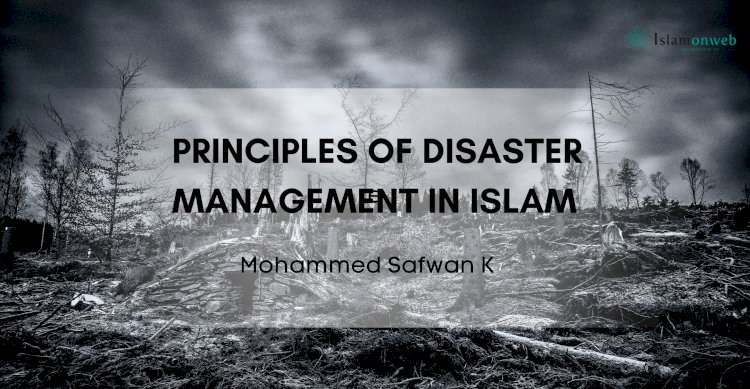


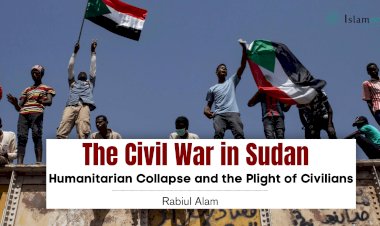
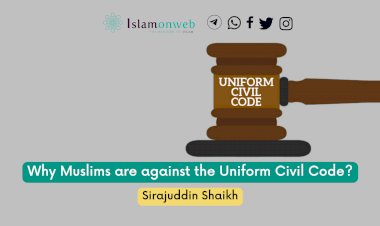


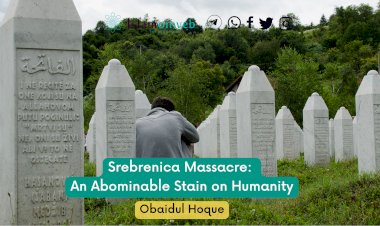
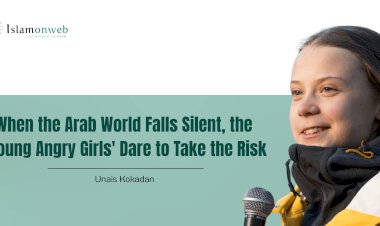














Leave A Comment